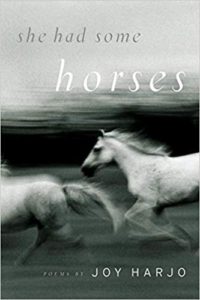Adina Hoffman: Ben Hecht: Fighting Words, Moving Pictures
June 30, 2019 by David
Filed under Non-Fiction, WritersCast
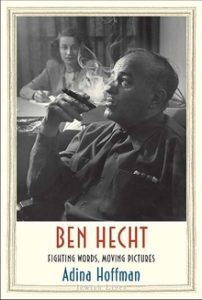 Ben Hecht: Fighting Words, Moving Pictures – Adina Hoffman – 9780300180428 – Yale University Press – Hardcover – 264 pages – $26 – February 12, 2019 – ebook versions available at lower prices
Ben Hecht: Fighting Words, Moving Pictures – Adina Hoffman – 9780300180428 – Yale University Press – Hardcover – 264 pages – $26 – February 12, 2019 – ebook versions available at lower prices
I grew up in a family where the movie business was in our blood, and part of the conversations of everyday life, so I have long known about – and appreciated – the amazing screen writing of Ben Hecht. Hecht’s many screenplays in many ways established and defined what is now standard movie practice. He wrote some of the greatest and most watched films in history, and made a well paid career out of “doctoring” other writers’ scripts. Hollywood was his reluctant artistic base for many years, though he would never be completely comfortable there.
Reading this very comprehensive, but highly readable biography by Adina Hoffman, brought Hecht’s life and work into focus for me for the first time. Hecht’s story was that of a classic 20th century second generation Jewish immigrant. He was raised in Wisconsin, made his way to Chicago, became a newspaper writer and then a novelist in the glory years after World War I, where he helped create and define the literary scene in that great city, before moving to New York, where he truly established himself as literary star.
Hecht and Charles MacArthur together wrote the now-classic play, The Front Page, becoming writing partners and pals for many years thereafter. Some of Hecht’s most famous screenplays include Scarface, Gone with the Wind, Stagecoach, Notorious and His Girl Friday. Hecht worked on literally hundreds of films, was a powerful enough writer to be able to be given the opportunity to produce four films with MacArthur (a mis-adventure described wonderfully by Hoffman). Hecht worked with some of the greatest directors, producers and actors in 20th century film. His work literally defined what a Hollywood movie could be, and much of what we think about 20th century American culture is derived from his cynical, yet optimistic worldview.
Hecht’s many novels and nonfiction books are not widely read or known today, and according to Hoffman, who has read them all, some are lost to literary history for good reason. Still, it is quite possible that this fully formed biography with its clear eyed evaluation of Hecht as passionate human, brilliant intellect and outstanding writer, will help their cause. For myself, I have made a commitment to read at least one or two of the books that Hoffman tells us are important enough to seek out, including at least one novel. I have thought about reading Hecht’s very early novel Fantazius Mallare: A Mysterious Oath, even though Hoffman pretty much dismisses it, except for one great sentence that is said to have inspired Ginsberg’s Howl. But it is his autobiography, A Child of the Century that calls out to me the most, and that I will be reading soon.
Though he was decidedly a non-secular Jew during World War II, Hecht rediscovered his Jewish identity and became a powerful public voice pressuring American politicians to save the Jews of Europe. After the war, Hecht’s Zionism led him to support the nascent Jewish state of Israel with the burning fervor of a convert, his trademark enthusiasm focused on building a safe haven for Jews, which ironically, he never visited. Hecht, as Hoffman shows us, was a complicated human being – and frequently an unforgivable one as well.
Ben Hecht was emblematic as the “child of the [20th] century” who helped to define modern Jewish America and modern popular culture. Adina Hoffman is a terrific writer and a gifted storyteller, perfectly suited to tell this story. Thanks to Yale University Press for creating an absolutely beautiful book, one that serves her writing well, and makes reading it a better experience.
Adina Hoffman is an essayist and biographer who splits her time between New Haven and Jerusalem. Fortunately, she was in New Haven when I wanted to talk to her about this book and the work that went into it. Hoffman is the author of four books, including Till We Have Built Jerusalem: Architects of a New City and My Happiness Bears No Relation to Happiness: A Poet’s Life in the Palestinian Century. She was a film critic for the American Prospect and the Jerusalem Post, and was a founder and editor of Ibis Editions, a small press devoted to the publication of the literature of the Levant. She has been a visiting professor at Wesleyan University, Middlebury College, and NYU, and was notably one of the inaugural (2013) winners of the Windham Campbell prize. Read more about Adina and Ibis Editions here.
And you can find a good bibliographical of Hecht’s work here.
Note to listeners, this interview was recording live in a room with a bit of echo, so apologies to all for the sound quality.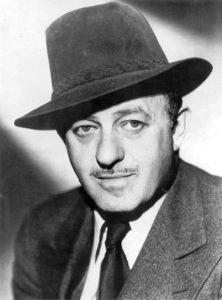

Podcast: Play in new window | Download
Joy Harjo has been named U.S. Poet Laureate
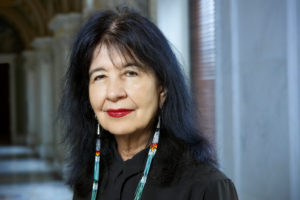 Congratulations to Muscogee Creek Nation poet Joy Harjo who has been appointed the Poet Laureate for the United States, succeeding Tracy K. Smith. Joy is a poet, writer and musician whose work has inspired for many years. She is fearless in her work, unflinching in her approach to language and the worlds of spirits and of humans. Her many books include Conflict Resolution for Holy Beings, How We Became Human, A Map to the Next World, and the ever-gorgeous collection, She Had Some Horses. I interviewed Joy about her memoir Crazy Brave in 2016, which you can find on Writerscast here.
Congratulations to Muscogee Creek Nation poet Joy Harjo who has been appointed the Poet Laureate for the United States, succeeding Tracy K. Smith. Joy is a poet, writer and musician whose work has inspired for many years. She is fearless in her work, unflinching in her approach to language and the worlds of spirits and of humans. Her many books include Conflict Resolution for Holy Beings, How We Became Human, A Map to the Next World, and the ever-gorgeous collection, She Had Some Horses. I interviewed Joy about her memoir Crazy Brave in 2016, which you can find on Writerscast here.
“It’s such an honoring for Native people in this country, when we’ve been so disappeared and disregarded,” Harjo says. “And yet we’re the root cultures, over 500-something tribes and I don’t know how many at first contact. But it’s quite an honor … I bear that honor on behalf of the people and my ancestors. So that’s really exciting for me.”
From Conflict Resolution for Holy Beings:
1. SET CONFLICT RESOLUTION GROUND RULES:
Recognize whose lands these are on which we stand.
Ask the deer, turtle, and the crane.
Make sure the spirits of these lands are respected and treated with goodwill.
The land is a being who remembers everything.
You will have to answer to your children, and their children, and theirs—
The red shimmer of remembering will compel you up the night to walk the perimeter of truth for understanding.
As I brushed my hair over the hotel sink to get ready I heard:
By listening we will understand who we are in this holy realm of words.
Do not parade, pleased with yourself.
You must speak in the language of justice.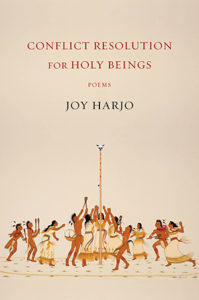
Ryan Leigh Dostie: Formation: A Woman’s Memoir of Stepping Out of Line
June 7, 2019 by David
Filed under Non-Fiction, WritersCast
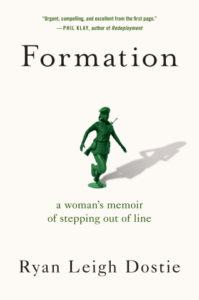 Formation: A Woman’s Memoir of Stepping Out of Line – Ryan Leigh Dostie – Grand Central Publishing – Hardcover – 978-1538731536 – 368 pages – $28.00 – ebook versions available at lower prices – June 4, 2019
Formation: A Woman’s Memoir of Stepping Out of Line – Ryan Leigh Dostie – Grand Central Publishing – Hardcover – 978-1538731536 – 368 pages – $28.00 – ebook versions available at lower prices – June 4, 2019
Ryan Leigh Dostie’s story is sometimes a painful one to read, but it is too important to not read, and this is a book I can and must recommend to all readers. Ryan comes from an unusual background. She was raised in a women-run Christian community for most of her early life. Though she wanted to be a writer, she joined the Army after high school, trained to be a linguist, and was on the more or less normal course of a teenaged woman making her way in a male dominated military force, when she was raped by another soldier in her unit.
Her memoir recounts what happened to her, what she experienced subsequently, and how she lived through and was affected by, not only her personal trauma, but the experiences she shared with other soldiers in an active deployment in Iraq, where she was part of the first wave of the American invasion in 2003. It’s a sometimes harrowing story, but also inspiring, raw and powerful, as Ryan does not flinch from showing everything she experienced and felt through a long period during and after her most powerful personal experiences in the Army.
This book does not overtly take a particular political position, despite the pain and suffering the author endured throughout her time during and after her service. But it is impossible to read this book and not be forced to think about so many of the issues around male-female relationships, power and how it is applied, the patriarchal structure that dominates our culture, and the work needed to change the way men and women interact on a daily basis.
This is the story of one woman’s journey, as such, it is thoroughly compelling, but Formation cannot fail to affect anyone who reads it, and forces us to confront our own ingrained conceptual frameworks. Not only is the memoir a story of sexual assault in the narrow sense, Ryan’s story provides a representation of how societal structures affect us all, how the individual is made to be responsible for the failures of our systems, and hopefully will help spur us all to think how we might engage in the struggle to change those structures and systems sooner than later.
I’d also add that Ryan is, has become, a very good writer. It emerges in her story that she was an aspiring novelist when she was young, and after soldiering, she went on to complete a college degree, as well as an MFA. The writing in this book is evidence of how far she has come in learning her craft.
Her “official” bio: Ryan Leigh Dostie is a novelist turned soldier turned novelist. As an Army Persian-Farsi/Dari Linguist in Military Intelligence, she was deployed to Iraq during Operation Iraqi Freedom I and II (2003-2004). She holds an MFA in fiction writing and a bachelor’s degree in History from Southern Connecticut State University. FORMATION is her first book.
It was my pleasure and honor to interview Ryan Leigh Dostie in New Haven, Connecticut, where she lives today. Her website is well worth a visit – www.ryanleighdostie.com
“Though I knew it would be urgent, compelling, and excellent from the first page, Formation was a much more expansive book than I even could have suspected: a riveting, enraging memoir from an author of remarkable toughness and emotional range. This is an unflinching and honest account of war, of homecoming, and of what happens when a woman reports an assault and the institutions around her try to smother the truth.” – Phil Klay, author of Redeployment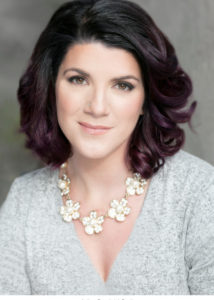
Podcast: Play in new window | Download
Erica Wagner: Chief Engineer: Washington Roebling, The Man Who Built the Brooklyn Bridge
May 6, 2019 by David
Filed under Non-Fiction, WritersCast
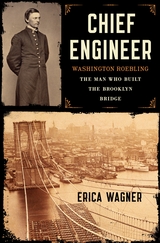 Chief Engineer: Washington Roebling, The Man Who Built the Brooklyn Bridge – Erica Wagner – 9781620400524 – Bloomsbury – Paperback – 384 pages – $18 – February 5, 2019 – ebook versions available at lower prices
Chief Engineer: Washington Roebling, The Man Who Built the Brooklyn Bridge – Erica Wagner – 9781620400524 – Bloomsbury – Paperback – 384 pages – $18 – February 5, 2019 – ebook versions available at lower prices
“A welcome tribute to the persistence, precision and humanity of Washington Roebling and a love-song for the mighty New York bridge he built.” – The Wall Street Journal
It is surprising to learn that Washington Roebling, builder of the Brooklyn Bridge and a major contributor to American industrialism of the late nineteenth and early twentieth century, has never had a full biography before this one, written by the excellent essayist and critic, Erica Wagner. I found her account of Roebling’s life story completely compelling. His relationship with his famous father, John Roebling, his experience and important role in the Civil War, and the amazing years-long effort to build one of America’s most iconic – and still fully operational – bridges, is brilliantly set forth by Wagner. She documents the important involvement of Roebling’s brilliant wife, Emma Warren Roebling is the completion of the bridge after Roebling’s health was compromised by illness, and gives us a portrait of an extraordinary and representative American life.
Frequently confused with his more famous father, Roebling has been forgotten or ignored by many. Yet his life holds interest for modern readers for a variety of reasons. His story is very much an American one – his family emigrating from Germany, living on the early 18th century American frontier, fighting in the Civil War, and becoming a key figure in the establishment of a modern American industrial society. We learn that Roebling was himself surprisingly self aware psychologically, a constant observer of his own and others’ human nature, how much he suffered both physically and psychologically, wounded by the abuse of his powerful father, and how he overcame so many obstacles to live a long life, adapting to the rapid pace of social and business life during a remarkable period in American history.
Erica Wagner uses Roebling’s recently discovered personal memoir to reveal much about his life that cannot be understood simply from documenting the major events of his life and the built artifacts he left behind. Roebling’s achievements are significant. Wagner’s achievement is that she brings this relatively unknown and complex man and his family to life in prose, a wonderful gift to readers.
American writer and critic Erica Wagner was the literary editor of the London Times for seventeen years and is now a contributing writer for New Statesman and consulting literary editor for Harper’s Bazaar. Her work has appeared in the Guardian, the Economist, Financial Times, and the New York Times, among other newspapers and magazines. She is the author of several books, including Ariel’s Gift, Seizure, and a collection of short stories called Gravity. She lives in London. It was a great pleasure for me to speak with her about this excellent book, and I hope Writerscast listeners will want to seek out and read this book as well.
“A masterful work of research, revelation and gripping narrative. It brings to pulsating life 19th-century New York and New Jersey and manages to be moving, too.” ―New Statesman, “Books of the Year”
Podcast: Play in new window | Download
Peter Rock: The Night Swimmers (A Novel)
April 7, 2019 by David
Filed under Fiction, WritersCast
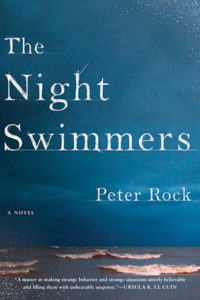 The Night Swimmers – A Novel – Peter Rock – ISBN 9781641290005 – Soho Press – Hardcover – 272 pages – $25.00 – March 12, 2019 – ebook versions available at lower prices.
The Night Swimmers – A Novel – Peter Rock – ISBN 9781641290005 – Soho Press – Hardcover – 272 pages – $25.00 – March 12, 2019 – ebook versions available at lower prices.
As I have said here before, one of the things I like best about doing the Writerscast interviews is that it’s introduced me to the work of many writers I would not have discovered on my own. The Night Swimmers is a perfect example. Peter Rock has been writing extremely fine fiction for many years, and yet I had never run across his work before, which still seems quite surprising to me, given the nature of his work.
Peter’s autobiographical novel captured my imagination from the outset. The writing is luminous and personal, dreamy, yet descriptive. His narrator is a young aspiring writer living temporarily in beautiful Door County in the northern reaches of Wisconsin’s Lake Michigan coastline. He’s bit lost, maybe stuck in his inability to see himself as an adult. He meets a young widow, Mrs. Abel, who is, like him, not exactly clear about herself and who she wants to be. She is older, attractive, smart and mysterious. The narrator finds himself swimming with Mrs. Abel at night without really knowing why, although there is a strong undercurrent of attraction between them, a tension that defines the essential mystery of their relationship, and the way they swim in the depths of the lake across large distances is similar to the ebb and flow of the narrator’s own life. And then Mrs. Abel disappears.
Some twenty years later, the narrator, who is now married, living in San Francisco and the father of two daughters, finds himself trying once again to understand what happened that summer, his psychic history rising to capture him like a deep lake current he used to swim in. He reads old letters and notebooks from the past, explores his relationship to a former lover, tries to understand through a sort of personal archeological expedition the world he once lived in and still cannot fully understand. Back in Door County once again, he tries to find out what happened to the elusive Mrs. Abel, and again he enters the deep lake waters to swim across the night.
Scattered throughout the book is the evidence of the narrator’s archeological exploration of his own history, pieces of paper, old emails, quotations from poets, and references to the extraordinary and strange psychic photographer Ted Serios. This book is a sort of literary pastiche that really could exist in multiple forms and formats, reflecting the author’s psychic imagination crossing over time and space through the medium of memory.
The Night Swimmers is a beautiful, complicated and challenging work of literary inspiration I found completely engaging. And it was a pleasure then, to have the opportunity to speak with Peter Rock about his fine novel.
“Peter Rock has written a weird and haunting story about a younger man and an older woman who like to swim in the dark. Happily The Night Swimmers is no male coming of age story. Instead their secret nightly practice in a dark and foreboding lake shimmers as a queer refusal for either of them to grow up right.”
—Eileen Myles, author of Afterglow
I recommend visiting Rock’s website, and follow the link to The Night Swimmers page, where there are some great visuals related to the book.
Peter Rock was born and raised in Salt Lake City. He is the author of several novels SPELLS, Klickitat, The Shelter Cycle, My Abandonment, The Bewildered, The Ambidextrist, Carnival Wolves and This Is the Place, as well as a story collection, The Unsettling. Rock attended Deep Springs College, received a BA in English from Yale University, and was a Wallace Stegner Fellow at Stanford University. He lives in Portland, Oregon, where he is a Professor in the English Department of Reed College. Leave No Trace, the film adaptation of My Abandonment, directed by Debra Granik, premiered at Sundance and Cannes and was released in 2018.
Podcast: Play in new window | Download
Joseph Kelly: Marooned: Jamestown, Shipwreck, and a New History of America’s Origin
March 18, 2019 by David
Filed under Non-Fiction, WritersCast
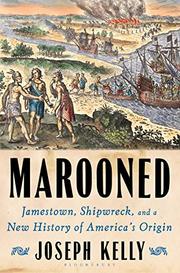 Marooned: Jamestown, Shipwreck, and a New History of America’s Origin – Jospeh Kelly – 978-1-63286-777-3 – Bloomsbury – Hardcover – 512 pages – $32 – October 30, 2018 – ebook versions available at lower prices
Marooned: Jamestown, Shipwreck, and a New History of America’s Origin – Jospeh Kelly – 978-1-63286-777-3 – Bloomsbury – Hardcover – 512 pages – $32 – October 30, 2018 – ebook versions available at lower prices
I really enjoy reading books about American history, and especially lately, books that explore some of the stories and moments that are foundational to the history of this continent, but are not well known or well told. And I’ve also become extremely concerned about gaining a better and more nuanced understanding of those stories that have been told solely from the perspective of the European (white) perspective that dominates our historical narrative, and thus our understanding of ourselves.
Joseph Kelly’s Marooned is just such a book, and I was immediately drawn to it. This is an insightful re-examination of the 1607 Jamestown settlement, the story of which really should replace the Mayflower colony’s position as America’s founding Puritan-centric myth.
In fact, the multiple stories of Europeans’ initial contact with the native peoples who fully inhabited North, Central and South America all require a complete re-examination, and I have been reading several books that provide insight into the way these continents were conquered by the marauding Europeans and their violence and diseases.
Marooned is about much more than just the Jamestown settlement. The book begins by recounting the settlement’s really awful circumstances. Most of those early settlers died of disease or starvation or deserted to the local tribes for protection. The workings of the Virginia Company that was set up to colonize and exploit the supposedly “virgin” New World are fascinating and in some ways depressingly familiar to our modern large scale version of unrestrained capitalism.
The traditional blame for the miseries of Jamestown’s early years goes to those leaders who failed to manage their “lazy” colonists, as opposed to those who were ready, willing and able to literally whip them into shape. But Kelly makes it clear that because it was the aristocrats who wrote the documents on which our traditional history relies, the real story may be, likely is, significantly different. Kelly finds ample evidence that the colonists who were cast into the wilderness, “marooned” from home and trying to survive, experienced a far different reality than their leaders. Many of them had a nascent understanding that Britain’s rigid class structure would not work in this different environment, and that their actual survival required a far more equitable system of governance. In fact, there were many uprisings and expressions of rebellion, all of which were put down, although a limited electoral oligarchy emerged during the course of the 17th century in the Virginia colony.
There are many side trips and journeys throughout this engaging narrative. The story of the castaways from one of the resupply ships on Bermuda, truly a story of being marooned, is striking. Nine ships en route to re-supply Jamestown in 1609 were hit hard by a hurricane, a storm of extreme high winds and waves, and one ship, the Sea Adventure, with some of the key leaders of the expedition on board, was wrecked on the shores of the Bermudas. The crew reached one of the islands in safety, and almost a year later, after building two boats by hand, they sailed again for Jamestown, and somewhat surprisingly, were able to reach their destination not long after departing from Bermuda. This story circulated widely in London, and may well have inspired Shakespeare’s great play, The Tempest. The timing is certainly right for that to be the case.
Kelly contributes a significantly better understanding of the Powhatan Confederacy’s formation and politics before and during the settlement period, as well as the fluidity between the cultures of the native peoples and the colonists. Marooned is not just the story of the Europeans and their conquest, but successfully weaves together the the narrative of the struggles of native peoples of that time and place in their powerful efforts to survive the arrival of the brutal land grabbing English settlers and the lives of the colonists at the lower ends of the social strata, whose stories we rarely, if ever, get to know.
It is a pleasure to discover such a good writer and story teller as Joe Kelly is. In this book, he truly brings history alive through its people, and with a narrative built on a solid grounding of research and a deeper understanding of the complexities of perspective than many other historians.
Joseph Kelly holds a Ph.D. in English from the University of Texas, Austin, and is a professor of literature and director of Irish and Irish American Studies at the College of Charleston. He is the author of America’s Longest Siege: Charleston, Slavery, and the Slow March Toward Civil War, and the editor of the Seagull Reader series. He lives in Charleston, South Carolina. Joe’s blog can be found here.
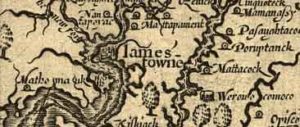
Podcast: Play in new window | Download
Maureen Owen and Barbara Henning reading in Tucson, Arizona
March 3, 2019 by David
Filed under AuthorsVoices
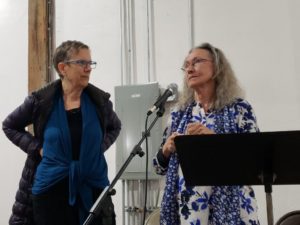 What a great trip! Starting January 18, 2019, with a reading at McNally Jackson Bookstore in Brooklyn, New York, poets Maureen Owen and Barbara Henning, started a cross country journey together (you can view their trip itinerary here).
What a great trip! Starting January 18, 2019, with a reading at McNally Jackson Bookstore in Brooklyn, New York, poets Maureen Owen and Barbara Henning, started a cross country journey together (you can view their trip itinerary here).
Appropriately, their story and journey began in Brooklyn, where Barbara lives, and this amazing cross-country jaunt ends in Denver two months later, where Maureen lives.
The two writers have been blogging about their adventure here – their writing is terrific and fun, it is always fresh and lively, truly poets’ reportage, and reading their travel log will make you feel like you are along for the ride with them. They are having alot of fun and meeting and talking with some wonderful people along the way. They are getting to see some beautiful parts of our country too. Their two months on the road will feature 16 public events, and innumerable anecdotes and stories. It’s really fun to follow along with them as they travel, and when they are done, this will make a really interesting book.
I had the good fortune to be in Tucson, Arizona, when the two writers arrived there on February 14. Maureen is an old friend and colleague, so it was wonderful to get together with her, and to meet Barbara for the first time. When I went to hear them read for the POG Poetry reading series at the Steinfeld Warehouse Community Art Center, 101 West 6th Tucson on Saturday, February 16, and I recorded the event for this Authors Voices series here on Writerscast.
Local writer Steve Salmoni introduced the event. Poet and publisher (Chax Press) Charles Alexander introduced Maureen, and artist Cynthia Miller introduced Barbara, who lived in Tucson for a few years and has many friends there still.
It was a great event, and a wonderful opportunity to hear two terrific writers, both of whom engage with their audience and their writing. I’ve known Maureen for a long time, and believe she is one of the best poets of our time. Getting to hear Barbara Henning was a treat for me, as she is also a terrific writer of both poetry and fiction. I’m very pleased to have the opportunity to present this reading here.
Poet Maureen Owen was born in Minnesota, lived and worked in New York City and Connecticut, and has been living in Denver for a number of years, where she has long taught at nearby Naropa University. She was the founder of Telephone magazine and Telephone Books, worked at the Poetry Project in NYC, and is the author of a number of wonderful collections of poems.
Barbara Henning is a poet and fiction writer, born in Detroit, who has lived mostly in New York and Tucson since the early eighties. Aside from being the author of a number of books of poetry and fiction, she was also the editor of a book of interviews, Looking Up Harryette Mullen, and The Selected Prose of Bobbie Louise Hawkins. She is professor emeritus at Long Island University, where she taught for many years.
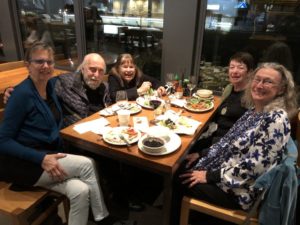
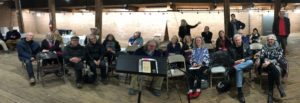
Podcast: Play in new window | Download
Susan Napier: Miyazakiworld: A Life in Art
February 20, 2019 by David
Filed under Non-Fiction, WritersCast
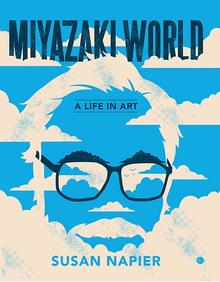 Miyazakiworld: A Life in Art – Susan Napier – 9780300226850 – Yale University Press – Hardcover – $30 – September 4, 2018 — 344 pages – illustrated – ebook versions available at lower prices
Miyazakiworld: A Life in Art – Susan Napier – 9780300226850 – Yale University Press – Hardcover – $30 – September 4, 2018 — 344 pages – illustrated – ebook versions available at lower prices
If you don’t know about Miyazaki and his spectacular animated films, I recommend you immediately seek out and watch at least two or three of the best of his films by way of introducing yourself to one of the most original and influential cultural figures of the post WWII era.
And this book, Miyazakiworld: A Life in Art, will be your guide to this creative genius’s oeuvre. Susan Napier brilliantly summarizes and analyzes Hayao Miyazaki’s life and work. She reveals much about the external influences on his work, his own particular life during and after World War II in Japan, and explores his cultural impact on Japan and the rest of the world, particularly the United States. Of course, if you are already familiar with Miyazaki, and have absorbed some or all of his incredible work, this book will illuminate much about the creator that you did not know before.
A thirtieth-century toxic jungle, a bathhouse for tired gods, a red-haired fish girl, and a furry woodland spirit all spring from the mind of Hayao Miyazaki, now well-known for films such as My Neighbor Totoro, Princess Mononoke, Spirited Away, Howl’s Moving Castle, and The Wind Rises.
Susan Napier is a professor at Tufts. She is a scholar specializing in contemporary Japanese culture. But this is not a dry academic explication of the master’s work. Napier is truly a fan, and she is a culturally adept explorer with a deep knowledge and understanding both of Japanese culture in general and of animated films and other key forms of Japanese pop culture. Napier brilliantly connects the multiple themes present in Miyazaki’s work, which features powerful female characters, is marked by environmental disasters, politically charged approaches to contemporary life, and a powerful sense of cultural and personal trauma and how to cope with it. She brings to life an understanding of an extremely complicated and sometimes mysterious individual, whose lifelong commitment to a unique artistic vision has transformed culture and art for millions of dedicated fans in Japan and all over the world.
Susan Napier is the Goldthwaite Professor of Rhetoric and Japanese Studies at Tufts University. She is the author of Anime from Akira to “Howl’s Moving Castle”: Experiencing Contemporary Japanese Animation, among other books.
It was my pleasure to have the opportunity to explore Miyazaki’s work in conversation with Professor Napier. You can read more about Susan from the Tufts website here. There was an excellent review of this book in the Washington Post here. And here is a link to the book at the Yale University Press website.
The NY Times was kind enough to make a 2017 list of Miyazaki’s films in order of importance – here.
Movie still from “Kiki’s Delivery Service.” (gkids/1989 Eiko Kadono – Studio Ghibli)
Podcast: Play in new window | Download
Philip Connors: A Song for the River
January 28, 2019 by David
Filed under Non-Fiction, WritersCast
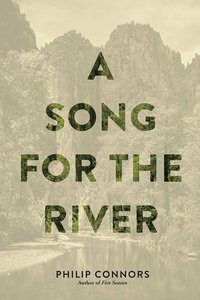 A Song for the River – Philip Connors – 978-1-941026-90-8 – Cinco Puntos Press – Hardcover – 256 pages – $22.95 – September 18, 2018 – ebook versions available at lower prices.
A Song for the River – Philip Connors – 978-1-941026-90-8 – Cinco Puntos Press – Hardcover – 256 pages – $22.95 – September 18, 2018 – ebook versions available at lower prices.
“The river that runs through the wilderness opens his heart: the mountains burn, friends die, and green shoots sprout from the ashes.”
Philip Connors, like some other fine writers of the desert southwest, notably Gary Snyder, Jack Kerouac and Norman Maclean, has been a long time fire lookout. Phil has spent many years in the Gila Wilderness in New Mexico. He began working as a fire lookout in 2002, and wrote about his experience in an earlier book, Fire Season: Field Notes From a Wilderness Lookout.
As it happens, I visited the Gila Wilderness for the first time in 2018, and was completely smitten by its beauty and the magnitude of the mountains, the vistas, and the Gila River. I’m sure I had read about the Gila at some point; it is famous for being the first wilderness area established anywhere in the world (in 1924), principally through the efforts of the great naturalist Aldo Leopold. Leopold was himself one of our best writers about nature; the Forest Service transferred him to Wisconsin, perhaps fortunately for the rest of us, as his Sand County Almanac has inspired so many to a better understanding of the natural world.
The Gila area is not only beautiful, but it is historically important as well. When we were there, we visited the famous Mogollon cliff dwellings, which are simply extraordinary. After that culture disappeared, the Gila was subsequently home to the Apache, and then the American pioneers, outlaws, and miners who displaced them. It’s an area which Connors knows intimately, and this powerful and emotionally gripping book reflects the depth of his knowledge of places and people, of the natural landscape and the depth of both human despair and our equally transcendent spirit.
There is a great deal of pain and sorrow in this book, but the spiritual and emotional power of Connors’ writing and his ability to transform experience into something resonant is important for himself and for his readers. The power of the writing is palpable and strong. It’s a beautiful book that I hope will be read by many.
Wilderness is where the heart grows stronger, or breaks, or both. No matter, we need these places and the writers who, like Connors, bring forth meaning out of pain, beauty out of loss.
Philip Connors was raised on a farm in Minnesota, went to the University of Montana for college, and spent a number of years working as a journalist. But he became disillusioned and made his way west, which clearly has become his true home and emotional center. His first book, Fire Season: Field Notes From a Wilderness Lookout won the National Outdoor Book Award, the Sigurd Olson Nature Writing Award, the Reading the West Award for nonfiction, and the Grand Prize from the Banff Mountain Book Competition. His second book, All the Wrong Places, a memoir of life after his brother’s suicide, was published in 2015.
Talking to Philip after reading this beautifully written, moving narrative of nature and loss was a great experience for me.
“Everything that is absent in the current political crises of this nation is abundantly present in Philip Connors’ A Song for the River: humility, quietude, forgiveness, and gratitude. His writing is pure, exact, compassionate, and often elegaic…I loved this book.”
—Benjamin Alire Sáenz, winner of the PEN/Faulkner for Everything Begins and Ends at the Kentucky Club
Visit Philip Connors’ own website here and his outstanding, El Paso based publisher, Cinco Puntos Press, here.

Podcast: Play in new window | Download
Bram Presser: The Book of Dirt (a novel)
January 8, 2019 by David
Filed under Fiction, WritersCast
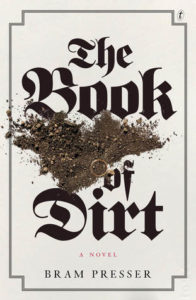 The Book of Dirt – Bram Presser – Text Publishing Company (Australia) – Paperback – 9781925240269 – 325 pages – $15.95 – September 11, 2018 – ebook versions available at lower prices
The Book of Dirt – Bram Presser – Text Publishing Company (Australia) – Paperback – 9781925240269 – 325 pages – $15.95 – September 11, 2018 – ebook versions available at lower prices
Personal and family history for most contemporary Jews is frequently fraught. Most of us have relatives who disappeared without a trace, except for scattered entries in German records of extermination. Some fewer of us have had living relatives whose lives were entwined with and defined by the Holocaust, almost always in horrific and devastating ways.
Bram Presser, an Australian punk rocker and practicing attorney who also happens to be a brilliant writer, spent eight years working on this novel, The Book of Dirt. It is a fabulous story that explores the real life story of Presser’s grandfather, Jakub Rand, from the 1920s onward through the Holocaust and beyond. Presser addresses history in all its complexity with the only tool that could possibly make sense of it – imagination.
Presser starts with family stories and personal legends, combined with archival research and interviews to create this novel. Of course it becomes partly fact, partly fiction. Some is memory and much is imagined.
The relatively large number of characters and the movement between places can be confusing for the reader, but Bram Presser’s grandfather, Jakub Rand, and his grandmother, Dasa Roubicek, and their immediate family are the focus of the book, and their story of survival shines through. The pain and suffering was immense and the power of humanity was as well.
You do not need to be Jewish to find this novel compelling and real. All of us can share through this novel what it means to find hope, and for the descendants of survivors of terror and loss to try to understand the stories of their forebears. This is a wonderful and transformative literary work.
The Book of Dirt has won a number of well-deserved awards in Australia. Bram Presser was born in Melbourne in 1976. He has been a punk rocker, an academic and a criminal attorney. He writes the blog Bait For Bookworms and is a founding member of Melbourne Jewish Book Week. His stories have appeared in Vice Magazine, The Sleepers Almanac, Best Australian Stories, Award Winning Australian Writing and Higher Arc. In 2011, Bram won The Age Short Story Award. Presser’s own website is very active and includes a great deal of material related to the stories behind The Book of Dirt; it is worthwhile to explore.
‘Meet Bram Presser, aged five, smoking a cigarette with his grandmother in Prague. Meet Jakub Rand, one of the Jews chosen to assemble the Nazi’s Museum of the Extinct Race. Such details, like lightning flashes, illuminate this audacious work about the author’s search for the grandfather he loved but hardly knew. Working in the wake of writers like Modiano and Safran Foer, Presser brilliantly shows how fresh facts can derail old truths, how fiction can amplify memory. A smart and tender meditation on who we become when we attempt to survive survival.’
Mireille Juchau
I hope you enjoy listening to Bram Presser talk about The Book of Dirt, a book I strongly recommend you seek out and read.
Podcast: Play in new window | Download

